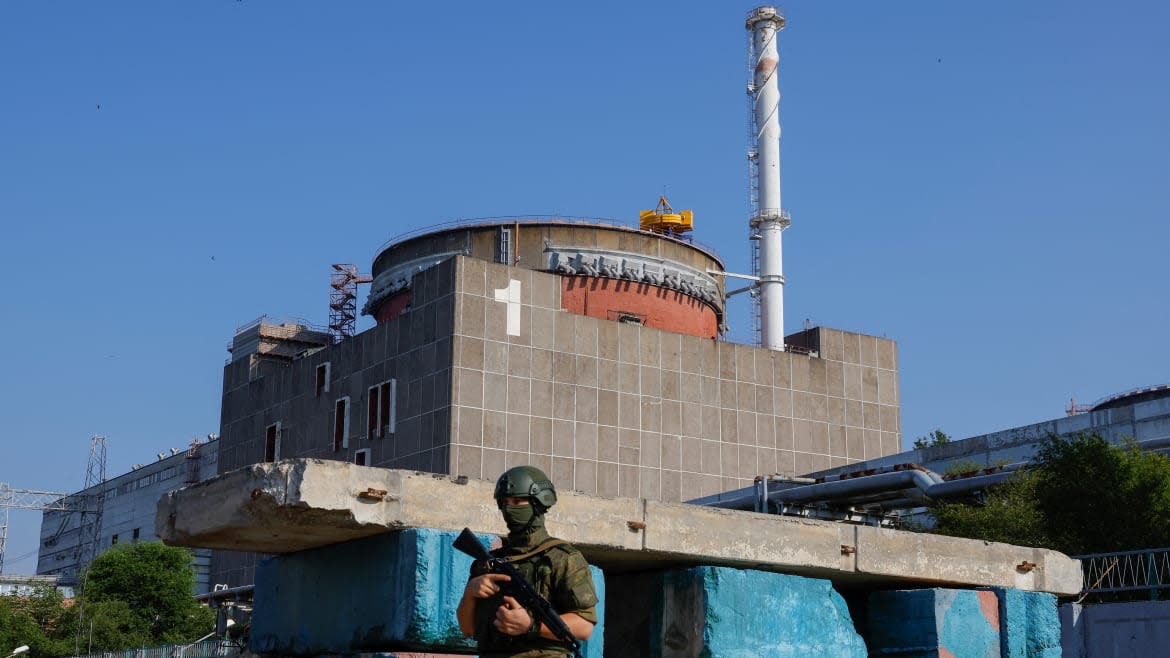Threat of ‘Major Nuclear Accident’ as Drones Hit Europe’s Biggest Power Plant

- Oops!Something went wrong.Please try again later.
The U.N.’s atomic watchdog agency said the Zaporizhzhia nuclear power plant in Ukraine was targeted by drone attacks on Sunday, with the agency demanding an end to the strikes which dramatically increased the risk of a nuclear accident taking place.
Russia, which has occupied the plant since March 2022, blamed the attacks on Ukraine—an allegation which Kyiv has denied. The International Atomic Energy Agency (IAEA), which has a team stationed at the plant, said the incident was the first such assault on Europe’s largest nuclear power plant since November 2022.
New Twist in Case of Ex-Guardsman Who Fled to Russia Amid Child Porn Charges
In a statement Sunday, Rosatom—Russia’s state nuclear corporation—said the plant had been “subjected to an unprecedented series of drone attacks” and called on the IAEA and European leaders to “immediately respond.”
Rosatom explicitly blamed the Armed Forces of Ukraine for the strikes. It said three people were injured at 11:38 a.m. when a drone hit near the plant’s canteen. Around 30 minutes later, another drone attacked a cargo area while a third hit the dome over the site’s sixth reactor.
“There was no critical damage or casualties; the background radiation at the station and the surrounding area has not changed and does not exceed natural background values,” Rosatom said. It also said it “categorically condemns” the attacks.
Russian President Vladimir Putin’s spokesperson also condemned the attacks on Monday. “This is a very dangerous provocation,” Dmitry Peskov said. “This is a very dangerous practice that has very, very bad negative consequences in the long term. Unfortunately, the Kyiv regime continues its terrorist activity.”
Despite the accusations, a Ukrainian intelligence official said Kyiv was not behind the attacks and suggested that Moscow was itself responsible.
“Russian strikes, including imitation ones, on the territory of the Ukrainian nuclear power plant [...] have long been a well known criminal practice of the invaders,” Andriy Usov, a spokesperson for Ukraine’s HUR Main Intelligence Directorate, told Reuters.
IAEA Director General Rafael Mariano Grossi said the attack represented a “major escalation” of the nuclear safety and security threats the plant currently faces.
“Such reckless attacks significantly increase the risk of a major nuclear accident and must cease immediately,” Grossi said in a news release.
IAEA experts at the plant inspected the sites affected by the drones, the agency added. Surveillance and communication equipment appeared to have been targeted at one of the plant’s reactor buildings, the agency said.
As experts were on the roof of the reactor six building, the IAEA said, “Russian troops engaged what appeared to be an approaching drone.” “This was followed by an explosion near the reactor building,” the agency added.
At another impact site, outside a laboratory, experts “saw blood stains next to a damaged military logistics vehicle, indicating at least one casualty.” The experts also reported “explosions and rifle fire on the site throughout the day” as well as “several rounds of outgoing artillery fire from near the plant.”
Grossi said that while the blast at the reactor six building did not compromise nuclear safety, “this was a serious incident that had the potential to undermine the integrity of the reactor’s containment system.”
“No one can conceivably benefit or get any military or political advantage from attacks against nuclear facilities. Attacking a nuclear power plant is an absolute no go,” Grossi added. “I firmly appeal to military decision makers to abstain from any action violating the basic principles that protect nuclear facilities.”
Get the Daily Beast's biggest scoops and scandals delivered right to your inbox. Sign up now.
Stay informed and gain unlimited access to the Daily Beast's unmatched reporting. Subscribe now.

